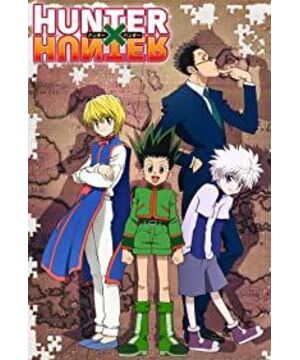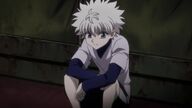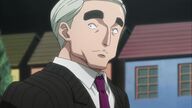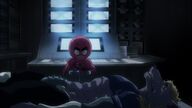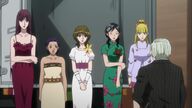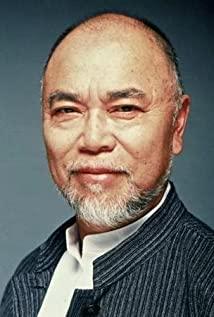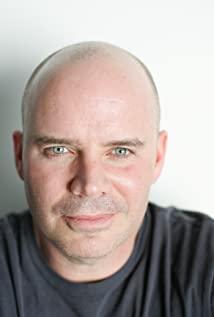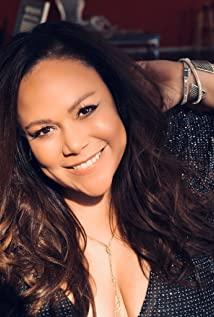Today I am 18 years old, and today, I read the legendary full-time hunter of the young man's peak.
It took me almost two weeks to watch the hunter from the beginning to the end. If my expectation for the hunter was 9 at the beginning, I would give him an 8 after reading it. I want to look at Hunter's work from three perspectives. The first is the characters, the second is the plot, and the third is the worldview. Overall, Hunters are excellent in every category. But there are some flaws in the plot, which will be mentioned later.
1. Characters
First of all, in terms of character characterization, the hunter perfectly met my expectations for him. At first, the urge to watch the hunter came from various aunts (such as Corgis, etc.) expressing how cute Qi Ya is, as well as the beautiful friendship between men and women. After watching it, the old thief really didn't live up to my expectations in this regard. The image formed by Qi Ya's sensibility, intelligence, rationality, appearance, and character can be deeply rooted in the hearts of the audience and directly reach the hearts of the audience. He has a bloody history, he crawled in the dark and was ruthless, but he was influenced by Gang and became kind, and he was able to cut swords for his brother. He is a bit arrogant, but he will also ask for help and thank people at important moments. In the face of challenges, although he really wanted to escape, he tried his best to survive. In the last election article, his interaction with Nanica and Kaluru showed his kindness and his desire to protect and protect others. From a certain point of view, the portrayal of Qi Ya is the only highlight of the election chapter, which offsets the flaws of the main plot to the greatest extent, which will be discussed later. Qi Ya is by no means perfect, he will be sad, he will be powerless, he will want to give up, he will sometimes feel weak, but he wants to do everything he can to protect Gang and his loved ones, and therefore, the audience will continue to I want to cheer him up, as if his persistent figure is his own. Qi Ya's growth in the later period has turned him into a living character, with his own consciousness and consciousness, and is no longer a dead thing in the author's pen. Fu Jian himself said that in the later stages of the work, he was constantly placing characters in different environments to see how they acted. I think the author's portrayal of Qi Ya is almost perfect. Of course, the portrayal of other characters in the hunter is also quite good, including the perverted Xisuo, the younger brother of Yimilu and so on. The charm of Fu Jian's characters is that they don't play cards according to the routine, and have an unpredictable charm, especially the villain.
Then there is Oka, one of the most controversial characters in this work. Gang is special for a shōnen royale manga work. Some people resent Gang's insensitivity to good and evil, calling his behavior pathological, and I agree to a certain extent. What strikes me a little bit is the meeting of Gang and Kim. Logically speaking, for a father who has put himself aside for the rest of his life and never comes back to see it, he should at least punch him... In particular, Kim is not saying that he has no time at all, and he should visit even if he is too busy. Some people may say that Jin Wan's disappearance may be because he wants to give Gang a goal and become a driving force for him to move forward. The role of suspense. Good, but as a child who has been abandoned for 12 years, Gang will also feel uncomfortable about his father's behavior, or blame him. But he didn't. At the moment of meeting, he excitedly shouted "Jin" and rushed up to chat with him happily. This made me afraid, because Gang's ability to respond and accept has far surpassed that of a 12-year-old child. His excessive cheerfulness, innocence, and magnanimity made people feel a chilling feeling, because Gang was like a cheerful empty shell, which would not be afraid. No whining, and that's probably why it's hard for me as a viewer to put myself in the role of Gang (I resonate more with Kiki instead). That's weird, right? In theory, Gang is the closest to ordinary people, and his growth environment is no different from that of a village child, but why is it easier for me to bring myself into the character who grew up in the assassination family, Qi Ya. The reason is very simple, Fu Jian's description of Gang's heart is too little. The only psychological descriptions are of Gang thinking about how to deal with the enemy during the battle, and at key moments (such as when Gang learns that Kate is dead, or when he meets Catwoman) the author only allows the audience to see Gang from a third-party perspective. Hollow-to-black eyes. There is a strong contrast between Gunnar's overly bright and innocent appearance, and his dark inner core, so that readers will never be able to understand or bring in Gunn, because he is so unusual! For readers, it is not unexpected that Gang's blackening, no, or even becoming a big boss one day. That's why Gunn has become a controversial character in the hunter's traditional kingship. The question is, is this portrayal a failure of Fu Jian? I don't think so, it's Oka's personality that makes Hunter's work so special. The protagonists who are passionate, uphold justice, and are completely good people, such as Naruto and the little hero's Green Valley, all show weakness (and boredom) in the later character characterization, why? Because the characters' reactions are too predictable, guarding justice, protecting, not hurting, Mary Sue, can never get away from these politically correct paths. At the beginning, it is possible to portray this way, but it will inevitably become weak in the later stage. On the contrary, complex characterizations like Gang are more likely to attract audiences and lead to some unusual plots. From a visual point of view, in hunters, good and evil are the front and back of the paper. Gang advocates extreme justice. He will use up everything to protect everyone around him, so he stands on the edge of the front of the paper (extreme), But because of this, it's easy for him to accidentally slip on the other side of the paper, which can be when he's being swallowed up by revenge for failing to protect someone important, or when he's sacrificing more people for his friends. Therefore, a character like Gang makes it impossible for readers to judge when he will go black and go berserk, which increases the variability of the plot direction. overall
Character summary: Hunter is very good in character characterization. Hunter has a total of more than 140 episodes, the dual protagonists have not changed, and many characters have repeated appearances, but they have never bored the audience characters. The portrayal of the secondary characters is also a matter of course, not deliberate at all, and everyone is impressive. Comparing the Twelve Kingdoms (the best in my heart) with the hunter, the one that impressed me the most in the Twelve Kingdoms is the heroine, the mouse, the King Yan, and the former princess, and the hunter has the will of the characters and the purpose of his behavior. , The portrayal of the character is on a par with that of the Twelve Kingdoms, and the in-depth portrayal of Qi Ya is even more direct to the soul. Maybe characterization is the best at Fu Jian (laughs)
2. Plot
Ah, so tired, I wrote a lot of characters... Next, I will write the plot. Overall, Fu Jian's arrangements for the hunter plot are great. Hunter has more than 140 episodes, which are divided into multiple chapters, each of which is very special, and the themes surrounding it are also varied and not repeated. Each chapter can stand on its own when viewed on its own, and all the chapters add up to form a colorful and continuous journey for Gang and Chiya. Of course, there are a lot of flaws in the plot.
The Hunter Exam can be said to be the beginning of the whole story, concise, cheerful and clear, quickly introducing the reader to an unusual world. For the reader, there is a strong "Ah, the journey begins." feeling. Some people say that the hunter exam chapter is optional, and the importance of the work is just a foreshadowing (Kurapica's Revenge, Oka's Father Finding, and the Black History of Qi Ya). The audience who thinks this way must be very impatient. I myself enjoy the feeling of slowly entering the story. As Jin said, it is like enjoying the scenery on the roadside. He has no big ups and downs, but his posture and colors are endless . This is my favorite chapter. Reading this article feels like reading the JOJO town chapter. Every level they pass through is like a story after another in JOJO. Among them, relying on the upper wind to pick the eggs really makes people admire Fu Jian's imagination. It's the little details that get me excited.
Next is the Sky Arena. The main function of this chapter is to introduce the hunter's combat power system (that is, the various systems of Nian) and let the two protagonists train their subordinates. The plot of this chapter is not very impressive to me. Combined with the Whale Island chapter, the effect is probably a link between the previous and the next, which is a good connection.
Then there is the Youkexin chapter/Phantom Brigade chapter, which is also a chapter that I think is flawed. First of all, let's talk about its highlights, that is, the battle between Kurabica and Wojin. When I watched it at the time, I simply fell in love with Kurapika's toughness and his complete dominance over difficult opponents. This fight should be considered the best fight in the whole series. Kurapika's obsession with revenge and consciousness are vividly reflected in the battle, and the shock to the audience is also strong. The battle between Kurabica and Wojin is at the beginning of the whole article, which also makes me, as a viewer, look forward to the next battle, but unfortunately, it becomes the only exciting and shocking battle in the whole article (Fu). Ken is also too good at disappointing the audience (laughs)) Although the next plot is really good, Kurapika put down his revenge in order to save his companions. It also deepened the growth of the characters and deepened the plot. Depth is no longer a simple fight, but more about understanding and letting go. What's wrong with the plot? In a word: Boss is too weak. Others may say, no, it's because Kurapika's consciousness is so deep that even Chrollo Ye can't fight back. But ah, as the main storyline, the big Boss is obviously so invincible at the beginning, but there is absolutely no room for the plot behind it. Even to highlight Kurapika's obsession, it's one step too far. Kurapika's overpower causes it to become pale later in the storyline. The author himself may have realized this, and he deliberately inserted the plot of the father and the old man who beat up the Hakka family to come and fight with Ku Luoluo. In the end, the old man's "If you get serious, I'm afraid I will die" is also deliberately highlighted. Chrollo's strength, however, is too deliberate, especially in this section, in addition to highlighting Chrollo's strength, it has no effect on the development of the plot. The inability of the boss in the later stage of the Phantom Troupe is a pity.
Then there is the Greed Island Arc. When it comes to the island of greed, I have to be convinced by Fu Jian's portrayal of the plot. It really will never let the audience get bored! As expected of an old thief, there are so many thieves! The plot trend of this kind of card game and then putting together the cartoon level is really very novel, especially when he suddenly appeared in an overhead world without this concept, and became an overhead world in an overhead world! So appealing. Furthermore, Fu Jian's careful description of each card and the plot design are also getting better. The Greed Island and Hunter Exams are similar in style. They are the type of leisurely leveling and customs clearance, and they look smooth and comfortable. But there are also flaws, that is, the big boss is too weak, just like the Phantom Troupe. It's not that the Bomber is weak, but that the character lacks depth both in appearance and inside, and is a standard villain who is bad for bad. This kind of plot is fine for children to watch, but at the age of 18, he really won't feel any sense of accomplishment in hitting such an enemy. Therefore, the excellence of the Greedy Island chapter is only at the level of the novelty of the Idea and lacks depth, but this is perfectly solved in the next ant chapter. Oh yes, I have an inference: because Greed Island actually belongs to the real world, all cards are theoretically real thoughts. The breath of the archangel, such a miracle, should also be real, so this thing may be one of the five hopes from the dark continent, but the question is how the game developer got it. I feel like this will be a huge foreshadowing.
Then there is the ant chapter that everyone is full of praise. In terms of plot, the ant chapter is the most complete, the most fluent in the beginning and the end, and the most burning chapter at the climax. But it may be because of all the touts that made my expectations too high before I started watching it, so I was not particularly satisfied with it in the end. Philosophically, the ant chapter takes the hunter to another level. The author is not appealing to the audience and teaching them what is right and what is wrong, but leaves all the space for the audience to think for themselves. Before the ant king fought with the president, his criticism of the injustice in the world and the incompetence and pedanticism of those in power was able to resonate with and convince the audience, and even made them begin to agree with the king's conception of the new world. At the beginning, the audience must not agree with Wang's theory that only people with strong physical strength can survive and dominate the world over resources. But Wang grew up, he knew wheat, and realized that the form of power is not equal to the size of a fist, but can be in various aspects. Therefore, Wang's vision for the new world is to give a plot of land to good human beings, even if they are thin (like wheat) but the Wang will respect their other talents, protect them, and remove the pedantic incompetence of resources dross. And this, no matter which reader will be shaken. In the theory of the ant king, he respects all species, and the living space other than humans is given to other species, rather than the existing world, where humans occupy and waste all resources and environments. There is no way to refute this new world in the mouth of the ant king, because all the refutations are like human defenses for their own selfishness, pale and powerless. From this moment on, the audience can no longer see the ant king as a villain, he is a thoughtful and excellent king who respects the weak, even if he is a Chimera ant, not a human being. Compared with the ant king, the human side looks extraordinarily rotten. The biochemical weapons used by the president, which can infect deadly viruses, have killed thousands of innocent lives because of the ambitions of boring politicians. All these comparisons make readers think, is the world conceived by the ant king better? Fu Jian did not give the readers answers, but left space for the readers to think for themselves, which is really a wonderful pen. In the end, the president completely ignored the ant king and did not discuss it with him. Killing the ant king by exposing himself to sacrifice himself further deepened this sense of human distortion. The chairman replied to Wang's invitation to discuss, "My position does not allow me to do this." The president has realized that the ideological ant king is not a villain, but if he does not kill the ant king, he will not be able to guard the things he cherishes - friends, juniors, hunter associations, etc., and all this, in the end, is still Human intimacy. President, as the most positive and righteous among hunters One of the characters, for the sake of personal love, is bound to kill the ant king. No matter whether the ant king is good or evil, what kind of thoughts he has, once the personal relationship is threatened, he must be eradicated. That's right, the president's battle with the ant king has sublimated the theme, and it is not concealed that human beings can ignore the means for their personal interests. And gradually, the audience began to think about what is the difference between humans and Chimera ants? Ants will do whatever they can to reproduce and enhance the survival rate of their offspring, and humans can do whatever they can for their personal feelings and desires. In the battle between the president and the ant king, who is good and who is evil? This vague notion of good and evil is the best part of the ant story. At the end, like many viewers, I cried (but Naiyama-san's voice was too loud, my aunts couldn't resist it), because the Ant King was too human-like. Between ants and humans, the ant king obviously chose the latter, and in the end, his whispers and calls to wheat were too touching the heartstrings of the audience. Emerum is a gentle king, who is so strong that no one can match him, but will kneel before Pam and ask her where Wheat lives. It should have been an honor and admiration for the president to sacrifice his life to kill the ant king, but at the end of the ant chapter, the audience's perception was changed by the ant king's humanity. The president's killing of the ant king even became a pity, even despicable thing in the eyes of the audience. This kind of reversal of good and evil can't help but cause readers to think and sigh (I also want to sigh the more I write). Of course, the ant chapter is not completely out of thorns. The narration of the narration in the climax is too long, and it is easy to lose focus on the battlefield. Kate's resurrection is also somewhat inexplicable. I understand that the author doesn't want important characters to die so that little ones can't sleep at night, but Kate's resurrection makes no sense at all and instead makes Gang's blackening in the moment seem meaningless. Of course, all of this is not worth mentioning in front of the excellent ant king plot, so the ant chapter is worthy of the hunter's best chapter, although it is not my favorite chapter (laughs) Among human beings, the ant king obviously chose the latter, and in the end, his whispers and calls to wheat were too touching the heartstrings of the audience. Emerum is a gentle king, who is so strong that no one can match him, but will kneel before Pam and ask her where Wheat lives. It should have been an honor and admiration for the president to sacrifice his life to kill the ant king, but at the end of the ant chapter, the audience's perception was changed by the ant king's humanity. The president's killing of the ant king even became a pity, even despicable thing in the eyes of the audience. This kind of reversal of good and evil can't help but cause readers to think and sigh (I also want to sigh the more I write). Of course, the ant chapter is not completely out of thorns. The narration of the narration in the climax is too long, and it is easy to lose focus on the battlefield. Kate's resurrection is also somewhat inexplicable. I understand that the author doesn't want important characters to die so that little ones can't sleep at night, but Kate's resurrection makes no sense at all, and instead makes Gun's blackening in the moment seem meaningless. Of course, all of this is not worth mentioning in front of the excellent ant king plot, so the ant chapter is worthy of the hunter's best chapter, although it is not my favorite chapter (laughs) Among human beings, the ant king obviously chose the latter, and in the end his whispers and calls to wheat were too touching the heartstrings of the audience. Emerum is a gentle king, who is so strong that no one can match him, but will kneel before Pam and ask her where Wheat lives. It should have been an honor and admiration for the president to sacrifice his life to kill the ant king, but at the end of the ant chapter, the audience's perception was changed by the ant king's humanity. The president's killing of the ant king even became a pity, even despicable thing in the eyes of the audience. This kind of reversal of good and evil can't help but cause readers to think and sigh (I also want to sigh the more I write). Of course, the ant chapter is not completely out of thorns. The narration of the narration in the climax is too long, and it is easy to lose focus on the battlefield. Kate's resurrection is also somewhat inexplicable. I understand that the author doesn't want important characters to die so that little ones can't sleep at night, but Kate's resurrection makes no sense at all and instead makes Gang's blackening in the moment seem meaningless. Of course, all of this is not worth mentioning in front of the excellent ant king plot, so the ant chapter is worthy of the hunter's best chapter, although it is not my favorite chapter (laughs)
Finally, finally, the election chapter (ah, I have written a lot, I’m about to finish it, I feel like I’m still unfinished, after writing this, I feel like I’m really saying goodbye to the hunters qwq) The flaw in the election chapter is: I don’t make sense, It is also the worst article in my opinion for hunters. Overall, it gives people a feeling that Fu Jian wants to intersperse the two lines of Qi Ya rescue Gang and chairman election, but it is far-fetched and lacks convincing. First, Qi Ya's rescue of Gang Line was a success, and Qi Ya's portrayal and growing audience are obvious to all. The loving interaction between Yaluqi and Qi Ya has become the spiritual food of all aunts. But the second line, the election line, is a failure. The problem lies in logic and characterization. I don't want to go into details, so I'll just focus on the main points. In the end, the mouse said that he predicted everything and became the chairman, but he immediately gave up the chairmanship, which made the whole election chapter extremely childish, and made the audience feel like "So I watched so much besides watching What else are you pretending to be? (Black question mark)" feeling.
In general, I think the story of the hunter is a little off. Although there are many bright spots, there are also a lot of flaws. Those who are excellent in the plot can refer to Attack on Titan. Although each season has a different style, it adds up to the coherence of the whole. The most important thing is that every little detail is impeccable. Only then can it be regarded as the Best of the Decade.
3 Worldview
The overall feeling of the hunter world view is very good. Gives a feeling of: Ah, the world has endless secrets to explore. There is a sense of being out of touch with reality, but also making sense. The relatively complete shaping of the worldview is probably in the dark continent chapter of the comics (although I haven't read it, and I don't really want to read it, there are too many words 233), and the worldview has suddenly been enlarged dozens of times. It feels like Fujian is playing a good game. Whether Nanica seems to be "from another world" or the origin of Chimera ants, it seems to be inextricably related to the Dark Continent and the outside world. And the plot of more than 140 episodes seems to only allow readers to see the tip of the iceberg of this vast world. This kind of endless world view setting is probably the only hunter.
- overall evaluation
Hunter is a near-perfect work. It is a work that no matter what age group people watch, they will gain something and be moved. In fact, I didn't want to write so much, but I found that I couldn't stop once I wrote it, because there were so many thoughts and feelings about hunters that I wanted to record. Finally, thanks to the hunter for bringing me so much moving, and telling me that there are cute babies like Qi Ya in the world -3-<33
Character setting 9
Plot 9
Worldview 10
Total: 28/30
View more about Hunter x Hunter reviews


